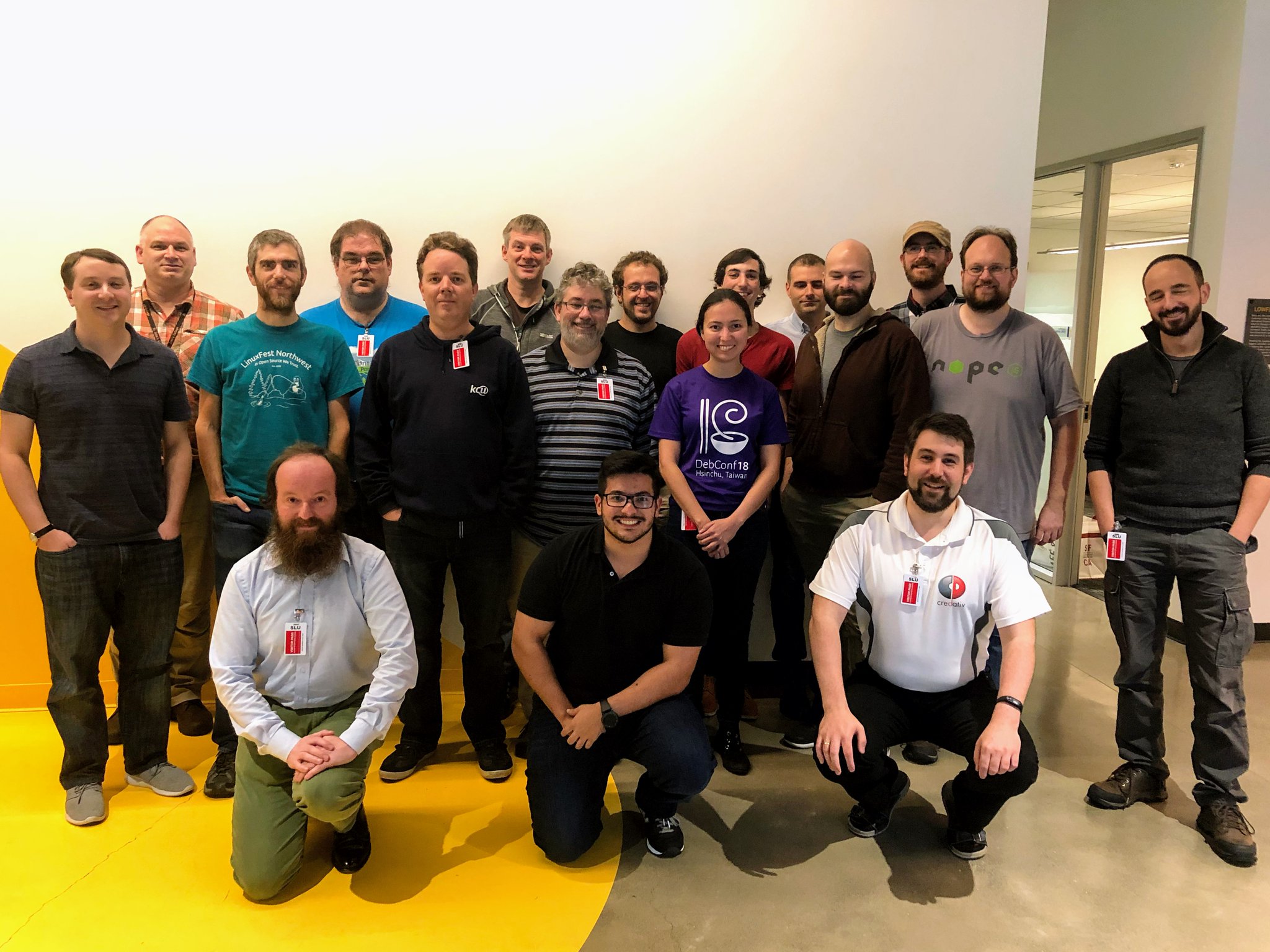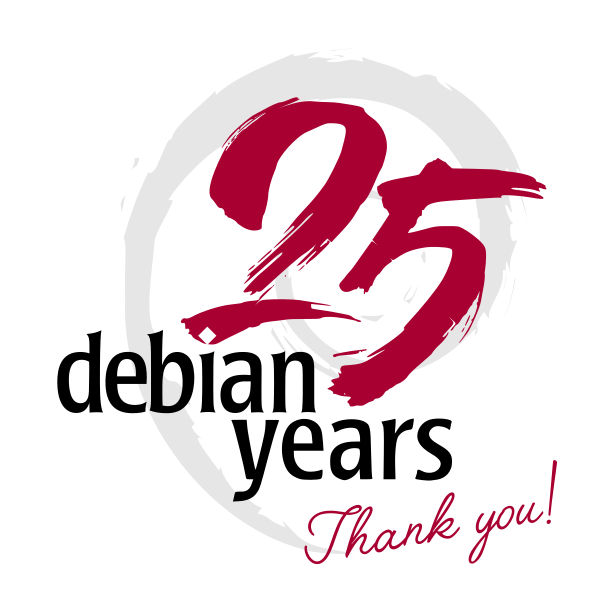The Debian Cloud team held a sprint for the third time, hosted by Amazon at its Seattle offices from October 8th to October 10th, 2018.
We discussed the status of images on various platforms, especially in light of moving to FAI as the only method for building images on all the cloud platforms. The next topic was building and testing workflows, including the use of Debian machines for building, testing, storing, and publishing built images. This was partially caused by the move of all repositories to Salsa, which allows for better management of code changes, especially reviewing new code.
Recently we have made progress supporting cloud usage cases; grub and kernel optimised for cloud images help with reducing boot time and required memory footprint. There is also growing interest in non-x86 images, and FAI can now build such images.
Discussion of support for LTS images, which started at the sprint, has now moved to the debian-cloud mailing list). We also discussed providing many image variants, which requires a more advanced and automated workflow, especially regarding testing. Further discussion touched upon providing newer kernels and software like cloud-init from backports. As interest in using secure boot is increasing, we might cooperate with other team and use work on UEFI to provide images signed boot loader and kernel.
Another topic of discussion was the management of accounts used by Debian to build and publish Debian images. SPI will create and manage such accounts for Debian, including user accounts (synchronised with Debian accounts). Buster images should be published using those new accounts. Our Cloud Team delegation proposal (prepared by Luca Fillipozzi) was accepted by the Debian Project Leader. Sprint minutes are available, including a summary and a list of action items for individual members.

Debian welcomes its new Outreachy intern
On Thu 29 November 2018 with tags announce outreachyWritten by Laura Arjona Reina

Debian continues participating in Outreachy, and we'd like to welcome our new Outreachy intern for this round, lasting from December 2018 to March 2019.
Anastasia Tsikoza will work on Improving the integration of Debian derivatives with the Debian infrastructure and the community, mentored by Paul Wise and Raju Devidas.
Congratulations, Anastasia, and welcome!
From the official website: Outreachy provides three-month internships for people from groups traditionally underrepresented in tech. Interns work remotely with mentors from Free and Open Source Software (FOSS) communities on projects ranging from programming, user experience, documentation, illustration and graphical design, to data science.
The Outreachy programme is possible in Debian thanks to the efforts of Debian developers and contributors who dedicate their free time to mentor students and outreach tasks, and the Software Freedom Conservancy's administrative support, as well as the continued support of Debian's donors, who provide funding for the internships.
Join us and help extend Debian! You can follow the work of the Outreachy interns reading their blogs (they are syndicated in Planet Debian), and chat with us in the #debian-outreach IRC channel and mailing list.
New Debian Developers and Maintainers (September and October 2018)
On Thu 08 November 2018 with tags projectWritten by Jean-Pierre Giraud
The following contributors got their Debian Developer accounts in the last two months:
- Joseph Herlant (aerostitch)
- Aurélien Couderc (coucouf)
- Dylan Aïssi (daissi)
- Kunal Mehta (legoktm)
- Ming-ting Yao Wei (mwei)
- Nicolas Braud-Santoni (nicoo)
- Pierre-Elliott Bécue (peb)
- Stephen Gelman (ssgelm)
- Daniel Echeverry (epsilon)
- Dmitry Bogatov (kaction)
The following contributors were added as Debian Maintainers in the last two months:
- Sagar Ippalpalli
- Kurt Kremitzki
- Michal Arbet
- Peter Wienemann
- Alexis Bienvenüe
- Gard Spreemann
Congratulations!
New Debian Developers and Maintainers (July and August 2018)
On Sun 09 September 2018 with tags projectWritten by Jean-Pierre Giraud
The following contributors got their Debian Developer accounts in the last two months:
- William Blough (bblough)
- Shengjing Zhu (zhsj)
- Boyuan Yang (byang)
- Thomas Koch (thk)
- Xavier Guimard (yadd)
- Valentin Vidic (vvidic)
- Mo Zhou (lumin)
- Ruben Undheim (rubund)
- Damiel Baumann (daniel)
The following contributors were added as Debian Maintainers in the last two months:
- Phil Morrell
- Raúl Benencia
- Brian T. Smith
- Iñaki Martin Malerba
- Hayashi Kentaro
- Arnaud Rebillout
Congratulations!
25 years and counting
On Thu 16 August 2018 with tags debian birthdayWritten by Ana Guerrero Lopez
Artwork by Angelo Rosa

When the late Ian Murdock announced 25 years ago in comp.os.linux.development, "the imminent completion of a brand-new Linux release, [...] the Debian Linux Release", nobody would have expected the "Debian Linux Release" to become what's nowadays known as the Debian Project, one of the largest and most influential free software projects. Its primary product is Debian, a free operating system (OS) for your computer, as well as for plenty of other systems which enhance your life. From the inner workings of your nearby airport to your car entertainment system, and from cloud servers hosting your favorite websites to the IoT devices that communicate with them, Debian can power it all.
Today, the Debian project is a large and thriving organization with countless self-organized teams comprised of volunteers. While it often looks chaotic from the outside, the project is sustained by its two main organizational documents: the Debian Social Contract, which provides a vision of improving society, and the Debian Free Software Guidelines, which provide an indication of what software is considered usable. They are supplemented by the project's Constitution which lays down the project structure, and the Code of Conduct, which sets the tone for interactions within the project.
Every day over the last 25 years, people have sent bug reports and patches, uploaded packages, updated translations, created artwork, organized events about Debian, updated the website, taught others how to use Debian, and created hundreds of derivatives.
Here's to another 25 years - and hopefully many, many more!
